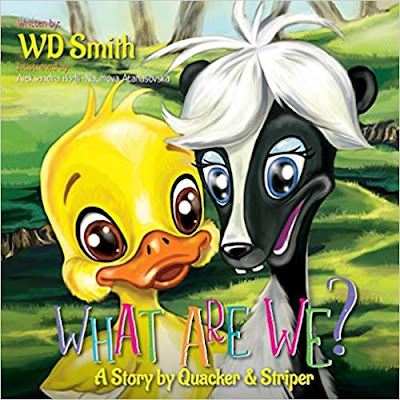What Are We? A Story by Quacker and Striper by W.D. Smith is a
sweet, little story about two friends... Quacker the duck and Striper the
skunk... who meet by accident and become fast friends. After getting to
know each other, they set out together on an adventure to answer the
question... What are we? Keep reading to learn more about Quacker and Striper and to find the details for a compare and contrast lesson plan.
Disclosure:
Affiliate links
to Amazon are included in this post.
Author's Summary
The storm rains down on the usually peaceful green valley for days, soaking
into the ground and leaving behind a steamy mist. Lost in the mist are two
very special little animals. Quacker is a little ducking with a bright
orange bill and a warm, friendly smile. Striper is a baby skunk with bright
blue eyes and a big goofy grin. Together, the two set out to find a
place where they can be safe and happy. Before they can do that, however,
Striper and Quacker decide they must find out what they are. A
whimsical tale of acceptance, What Are We? is a reminder
that when it comes to friendship, it’s who we are that really counts.
🍎 Title: What Are We? A Story by Quacker and Striper



search words: duck, ducks, duckling, ducklings, skunk, skunks, baby
animals
🍎 Author: W.D. Smith
🍎 Illustrator: Aleksandra Hadji-Naumova Atanasovska
🍎 Publisher: self-published
🍎 Date: August 5, 2018
🍎 Pages: 32

Language Arts Lesson Plan
What Are We? A Story by Quacker and Striper is a fun story to
read out loud to the class. It's entertaining and the illustrations
are gorgeous. Children really enjoy listening to stories like these.

Read Aloud #1
When you read What Are We? to your students for the first time, just
read through it and make it fun! (Reading is supposed to be
fun, after all.) Read it with expression and give the characters their
own voices. Talk about the illustrations and the animals Quacker and
Striper meet along the way. At the end of each page, ask the students
'What did that animal say Quacker and Striper are?' Then record their
responses on some chart paper. When you're done, take a look at the
chart you made. Ask your students what we can learn from this list and
from the story. I'm sure they will have lots of ideas to share with
you!
Read Aloud #2
If you are looking for a reading comprehension skill to go with What Are We?, I would suggest introducing Venn diagrams and how to use them to compare
and contrast two things. In the Venn diagram below, you can see there
are two overlapping circles. One circle is for Quacker; the other is
for Striper. Where the two circles overlap is for them both.
Students write words, phrases, or complete sentences in each section of the
diagram to compare how Quacker and Striper are the same and to contrast how
they are different.


To download a FREE copy of this Venn diagram (one page in all), please click
on the image above. Clicking this image will take you to the
Teachers-Pay-Teachers third-party website. This is a
FREE download-- no purchase necessary.

Have you read What Are We? A Story by Quacker and Striper yet? If so, what are some other reading activities parents and
teachers can try with it? Share your ideas in the comments below.
(Next Article:
10+ Children's Books About Mindfulness)


